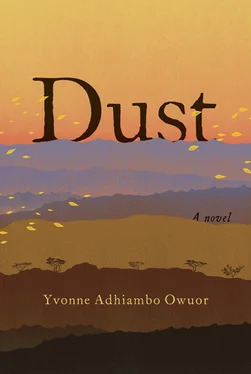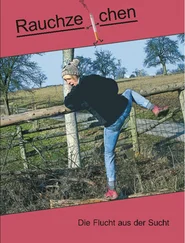From the corridor, the sound of utensils clattering on metal. A large woman in a polka-dot apron pushes open the door, wielding a large tray.
Petrus says, “Tea! But no Ali.” Petrus contrives a sigh. “He was chief investigating officer on your father’s case.”
“Yes?”
“Your presence has made him … er … emotional. Tea?”
“Wouldn’t mind. Black, a teaspoon of sugar.”

Rooftop view of the green city in the sun. Fewer trees every day. Dust devils on the plain, depleted animal species, their northern migration corridor being turned into a dense human settlement. Unspoken fears dart down too many alleyways and burp through the horns of far too many frustrated drivers. The post-election mood is unsettled. Accusations lurk, and there are any number of claimants who seek to be more sinned against than sinning. A mess.
Ali Dida Hada clenches and unclenches his fist. He taps his head with a knuckle. He is as tense as lightning-struck red cedar, struggling with syllables of thought. He had pursued the puzzle of Hugh Bolton for years, and as long as the money came from their anonymous client in England, the sums adjusted to inflation costs, he had been kept on the job. He had searched, but then he himself had got lost in the riddle. The best puzzle breaker of his graduating class. Then one mystery had taken hold of his will and talents. And in the end, he had lost a wife, a life, a plan, and he had not solved his only case.
After his stint in the northern lands, he was recalled to Nairobi to become a nonpracticing cryptanalyst with a high rank — assistant commissioner of police — exiled at a desk job with no defined duties. A grim smile. His achievements to date? Desert eulogist, with knowledge of water songs in seven northern-Kenyan languages, has-been chief of a thatch-roofed police post of three men at its peak. An unsolved case. A woman who owns his dreams, and a country he needs is disintegrating on him. He hunches over unbidden memories.
Wuoth Ogik, that desert house. He had examined it. Had wondered about it; its smallest details still materialized for him: soft pink of coral stone — where was that from, and how did it get here? Blue patterns on intricate tiles around a dead fountain. What did they suggest? Who chose them? The house’s name: Wuoth Ogik. Why? The inhabitants.
One in particular.
She had demanded, “Herdsman, a poem.” Years later, he had asked Akai Lokorijom, “Hugh Bolton?” She answered, “Just a name.” “You never heard of Hugh Bolton?” he persisted. “I hear so many names.” She sighed. “People are looking for him.” She turned to him. “Why should it bother me?” Ali Dida Hada did not have an answer then.
Akai had disheveled his thoughts. She had mixed up his questions until driven by a yearning he had yet to name, in spite of Nyipir’s presence, Ali Dida Hada reached for Akai: “Moon flowers — yellow, on the mountain in Ileret.”
“So?” Akai lowered her gaze as she scratched her arms.
“I need to take you to see them.”
The moon was nearer to Wuoth Ogik than Ileret would ever be. Akai gave Ali Dida Hada a sideways look. Then she moved so that their bodies connected. He could breathe her, bite her skin.
“You?” she whispered.
“Who else?”
“Now?”
“It’s time.”
“What kind of moon lights up those flowers?”
Ali Dida Hada had bent his head till it barely touched Akai’s.
“The oldest one. It knows secrets of night.”
“I need a forgetting moon,” she whispered. “That’s the one I want.”
“I’ll find it,” he vowed.
But then she had turned from him, an abrupt move. Walked through Wuoth Ogik’s courtyard. Left him standing, aching, wanting. No goodbye. Doors and case closed.
During his training as a cryptanalyst, one of Ali Dida Hada’s instructors had warned the class about the temptations of fixation — how seeking answers to a puzzle in a quest could turn into an obsession that colored reason, confused questions, and confounded minds. Ali Dida Hada had laughed with the rest of the class.
Case closed.
On his Nairobi city rooftop, the sun sends light through wispy, polluted clouds.
Footsteps on narrow metal stairs. Ali Dida Hada turns. The door swings open with a creak.
Petrus. Isaiah at his heels.
Petrus booms, “Ali! Brother!” Ali Dida Hada winces. “Mr. Isaiah William Bolton wanted to meet you and our dear Arabel Ajany Oganda. He is moved by your attempts to find his father. Oh, look! A premature moon. It will be a cold night. Maybe rain.”
Isaiah looks up. Petrus and Ali Dida Hada glower at each other.
Isaiah says, “I’d like to reopen the case.”
Ali Dida Hada glances skyward. “I’m finished with it.”
Isaiah pulls out a sliver of canvas from his coat pocket.
Ali Dida Hada stiffens, vowing that if Isaiah offers money he will arrest him for a bribery attempt. Isaiah proffers the canvas: “Would this help? My father’s work. The woman?”
Ali Dida Hada takes the bookmark with two fingers, tilts it into the light. It takes him a minute to understand that he is seeing a pregnant, nude, wide-eyed Akai Lokorijom.
His mind goes blank.
A thick fog shifts.
Right there, he understands the nature of his own lunacy, why it will never leave him.
Just a name , she had said.
He had believed her.
Petrus observes Ali Dida Hada. He knows Ali Dida Hada is unaware that tears are sliding down his face.
Within Ali Dida Hada a familiar sense of homelessness. Ceaseless unbelonging. In the 1960s, he had turned himself into a Kenyan, erasing a young man’s life forged in the Horn of Africa’s liberation wars. Being neither pro-nor anti-communist, he had walked away mid-battle from Eritrea through Ethiopia and into Kenya. Tucking himself at the end of livestock trains, he had watered and watched strangers’ camels and cows in exchange for water, meat, and, sometimes, shelter. He changed his name, he mimicked other people’s deeds, cadences, histories, and movement, until he was Ali Dida Hada. Almost a year later, he had stumbled upon a Kenyan police-recruitment exercise. He was lithe and fit, his arithmetic skills were precise, and he outran everybody else. Two camel clans stood by him, creating for him a genealogy. He was recruited into the forces.
Isaiah’s voice: “Does it help?”
Ali Dida Hada hands over the painting. “No.”
His voice is strained. “Excuse me, I’ve work to do.… Afande Petrus will help you.”
He heads for the steel door.
Petrus calls to him in Kiswahili: “Ali! We all have a case that confuses our skills — even me.” A gruff laugh. “The sudden disappearance of the Nairobi lord mayor’s great golden chain. Started a private investigation. A diversion. Was curious. Then it got intricate, and, yes, personal. Was all set to go to France to hunt for evidence, when, fortunately — I see that now — I run out of money.” A snort of laughter. “Anyway, Ndugu Ali, your problem is this, you hunt in darkness and alone. Always a risk.” Ali Dida Hada stops. “You also think truth is the same as order. Your downfall.” Ali Dida Hada touches the door. “What happened?” Petrus’s eyes are half closed. “Collusion? With Oganda?”
Ali Dida Hada drags open the metal door. He descends the steep steps. He hears Petrus tell Isaiah, “The search for your father cost Ali his family.”
“How?”
“They abandoned him.”
“Sorry to hear that.”
“Why?”
“Unfortunate loss.”
“No doubt.”
“About the obituary.”
“Yes?”
“Should we talk to its author?”
Читать дальше












